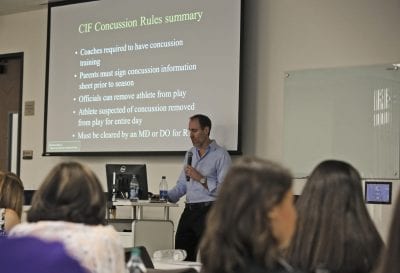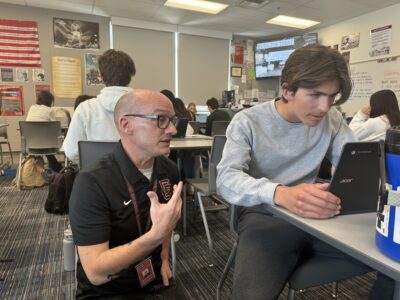“We are entering the age of enlightenment regarding concussions,” read a PowerPoint slide in the conference room at the Henry Mayo Center on Monday night.
That was the message of Monday’s youth sports concussion seminar. More education on the subject means less fear.
“When a concussion is managed correctly, hopefully it doesn’t lead to any long term consequences,” said Andrew M. Blecher, MD, a presenter at the seminar.
“It’s the ones that are managed incorrectly that get these bad outcomes and they’re almost always preventable when it comes down to teaching people what they need to do to prevent these bad outcomes.”
Blecher, along with Sarah Ehrsam, MA, ATC, the head athletic trainer at College of the Canyons, spoke for nearly two hours, briefing parents, fellow medical professionals and others involved in youth sports on the latest developments in youth sports concussions.
Knowing the rules that the CIF already has in place is important, the two medical professionals said. The CIF has been adding regulations from 2010 to 2017 to make sports safer for young athletes.
FOOTBALL: CIF’s new playoff system raises stakes of non-league
Before the season even begins, parents and athletes are to be distributed concussion and head injury information, which is required to be signed by the athlete and, if under 17, by a parent or guardian as well.
Coaches must also complete concussion education courses prior to the season.
If an athlete is suspected to have a head injury or concussion, they are to be removed from a practice or game and are not allowed to return until completing a return to play protocol and receiving written clearance from a doctor that they are cleared to play.


Parents must also be notified of the time of injury, the symptoms and any treatment provided to the athlete.
Nearly 90 percent of sports concussions are mild and symptoms dissipate in about one week, if the injury is handled properly, Blecher said.
“The mismanagement is the problem not necessarily participating in the sport,” Blecher said. “…If we can get things managed correctly through education to parents, coaches, athletes, administrators and get tighter control over what happens to these kids, then they’re not going to end up necessarily with long-term problems.”
Ehrsam urged parents to talk to their school’s athletic trainer if they have any questions about their child’s safety when it comes to sports.
“We’re staying on top of what is coming out new with the concussions,” she said. “So a parent doesn’t have to worry as much. They honestly have it easier at a high school. So use those athletic trainers.”
Both Blecher and Ehrsam noted that the perceived increase in concussions isn’t necessarily the fact that sports are becoming more unsafe, but rather that more concussions are being spotted because of better knowledge of the injury.
“We’re educating (athletes, coaches and parents), letting them know the signs and symptoms of a concussion, this is not a good thing, this isn’t normal, we need to let you recover from this,” Ehrsam said. “Then they can help us manage better.”
Plans are in the works for another concussion seminar on Saturday, Jan. 20.









